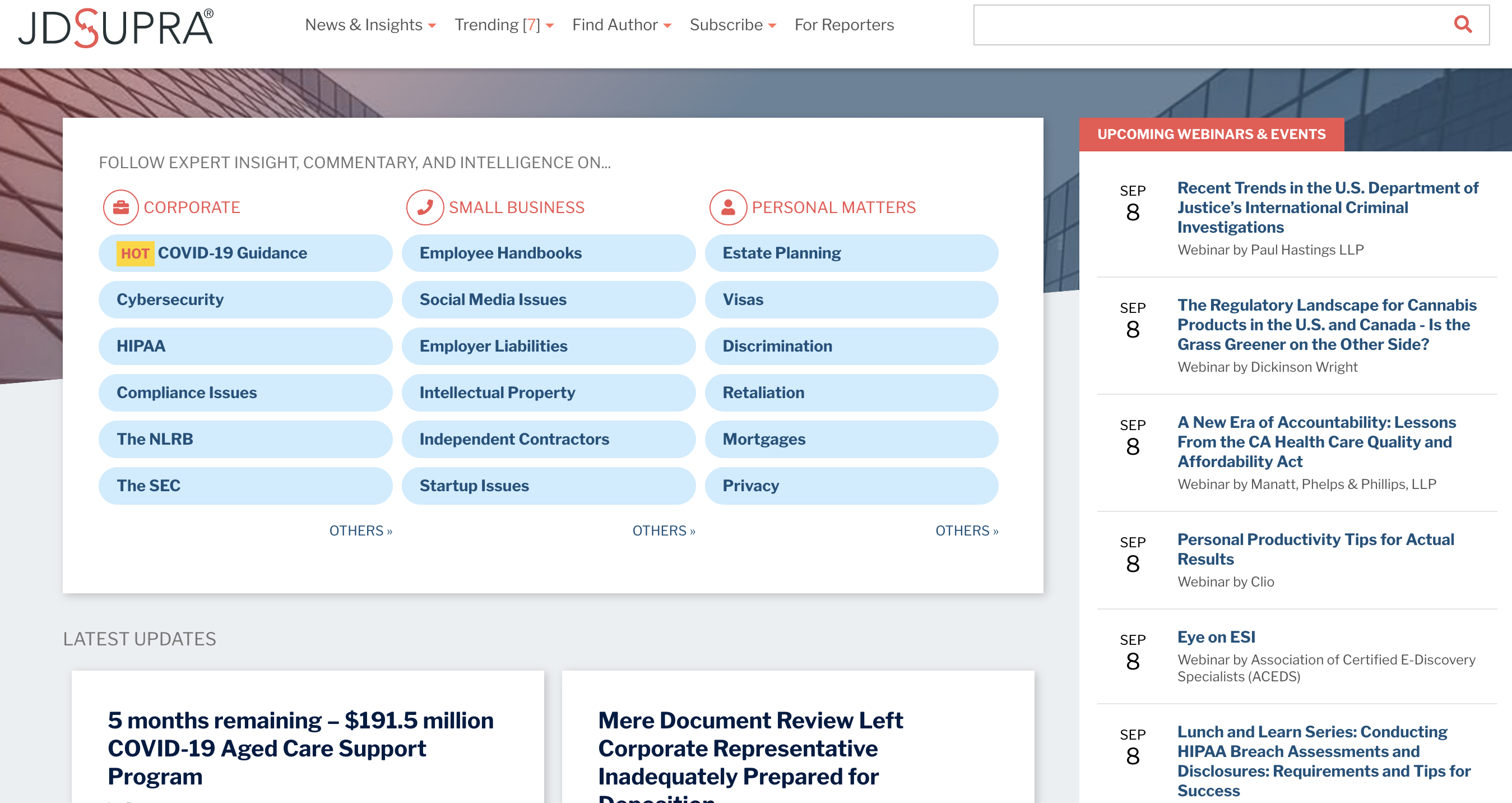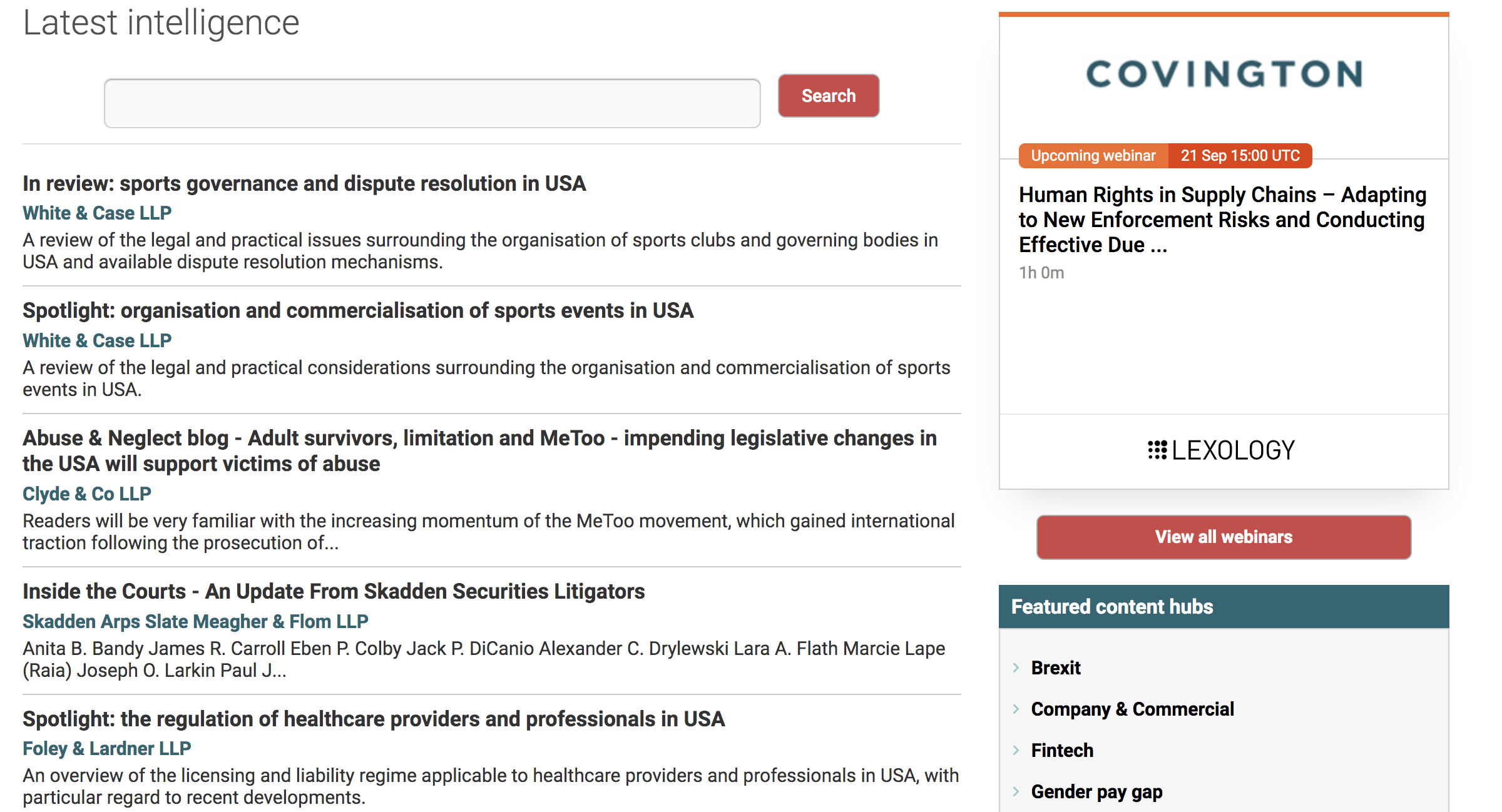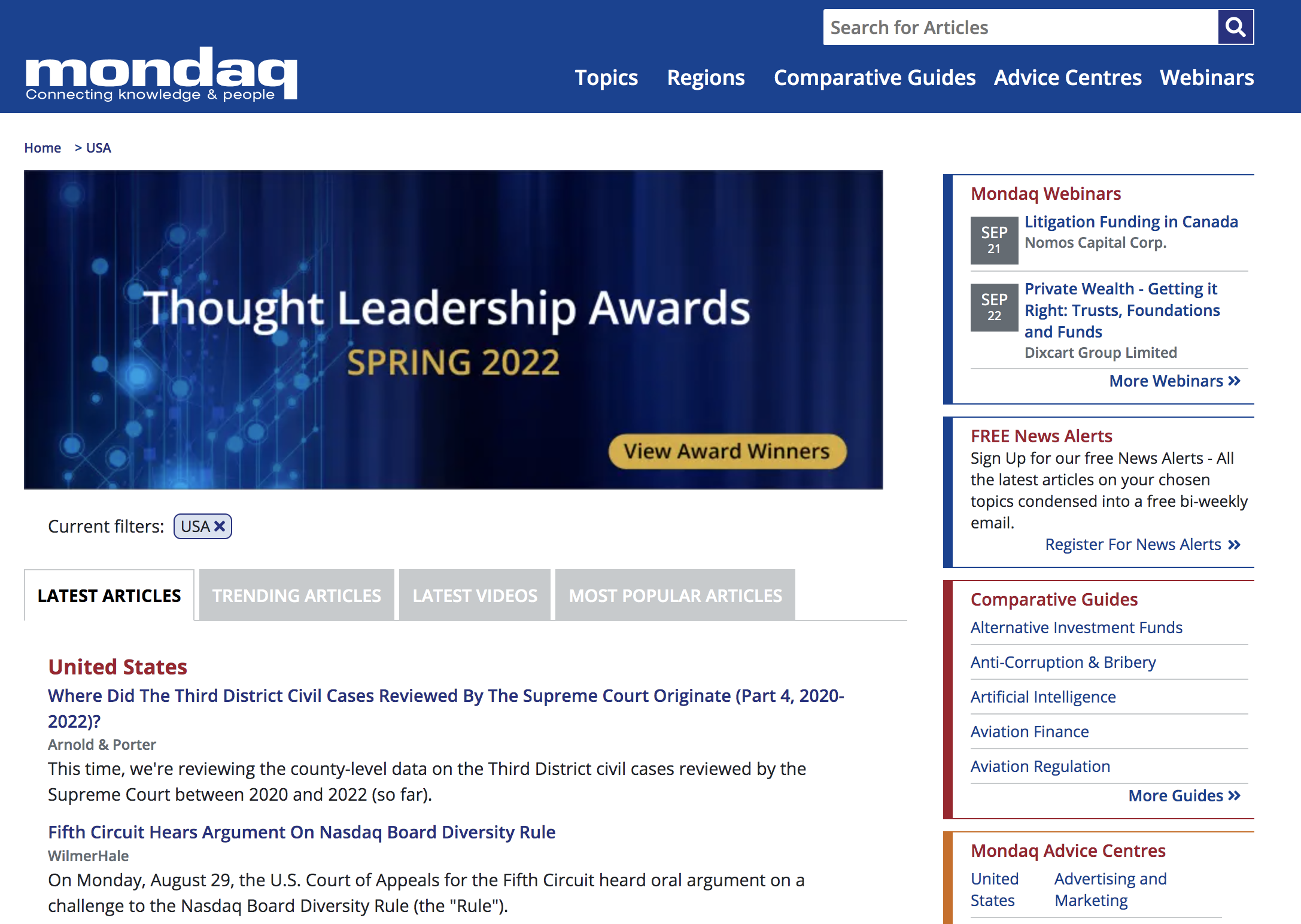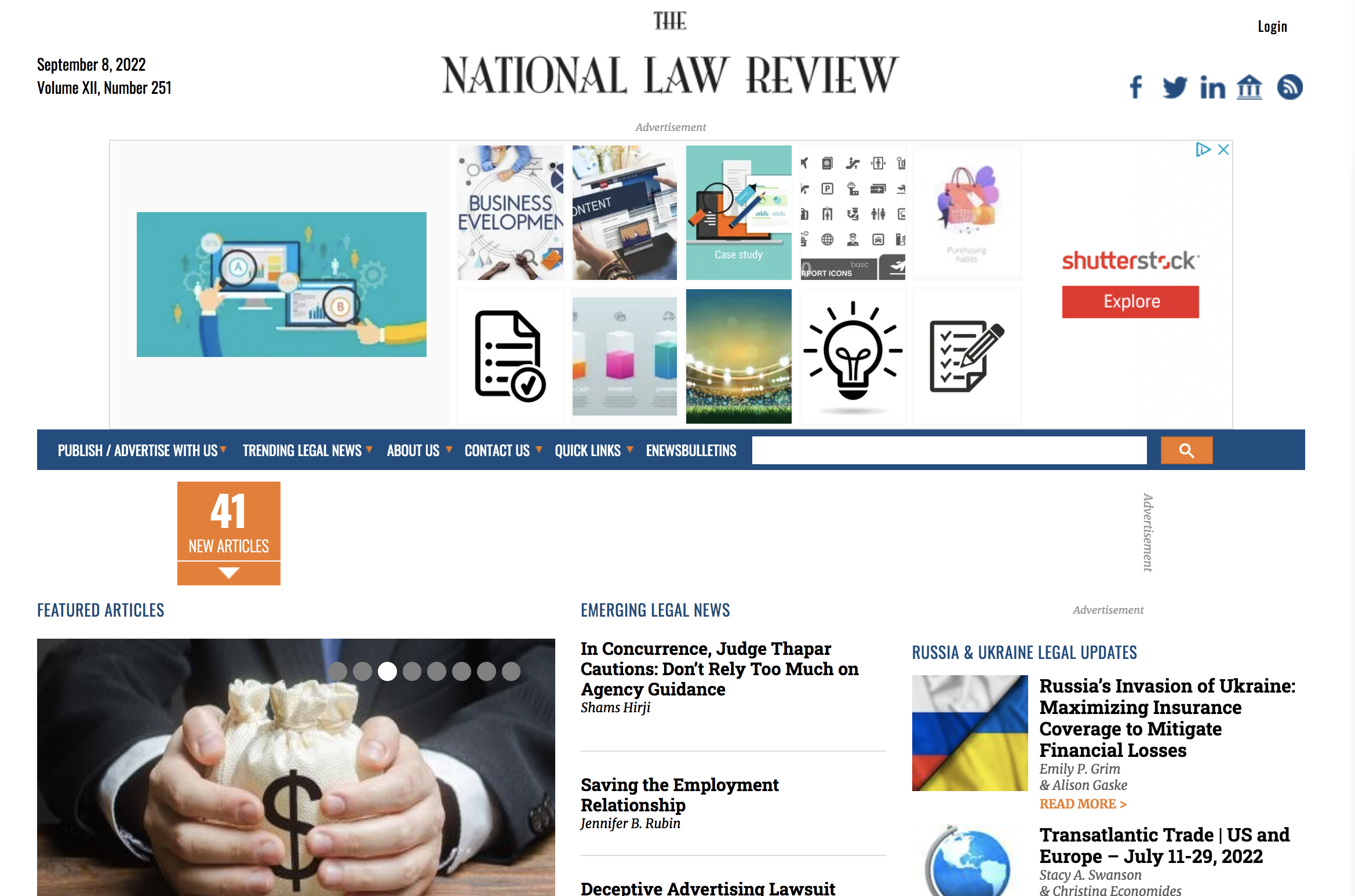
Top Content Aggregators Your Law Firm Should Consider
Content aggregators gather content from around the web or from contributors in order to provide readers with curated content and authors with an audience. When it comes to succeeding in thought leadership, content aggregators can be key. Services like Mondaq, JD Supra, and Lexology serve the legal industry by helping your firm’s content get read and providing you with relevant articles from expert voices. In this post, we discuss how different content aggregators can provide value for your firm.
Why are Content Aggregators Important?
Content aggregators are beneficial for both publishers and readers because they bring together a large number of articles on one particular topic for easy reading and use.
On one hand, as a law firm, you can use content aggregators to easily keep up with news in your industry, trending topics, and particular topics that are relevant to you.
Also, as a digital marketer, you can post your content to some of these sites to reach a new and/or wider audience outside of those who are already subscribed to your blog.
Top Content Aggregators for Law Firms
Whether you’re a small or large law firm, these content aggregators are useful for legal marketers who are looking to post their content or just simply keep up with legal industry topics.
1. JD Supra
JD Supra is one of the most popular content aggregators in the legal landscape with clients like DLA Piper and Latham Watkins. If you’re a contributing author, this platform can help you integrate both your content marketing and social media strategies in order to share your insights with the right audience. With a focus on the legal industry, the service connects your content with law firm directors, in-house counsel, lawyers, reporters, and editors who will find your knowledge and expertise relevant. With social analytics and monitoring functions, JD Supra helps your content get found on social media too. Through continuous consultations and guidance from content experts at JD Supra, your law firm can learn how to write the content your audience actually wants to read.
As we’ve mentioned in the past, content curation should be a part of your firm’s content marketing strategy. JD Supra can help you sort through valuable articles that your firm can then share through email newsletters or social media.
(For a deeper dive into how to craft a winning content marketing strategy, check out this free eBook: The Law Firm Guide to Content Marketing.)
2. Lexology
With over 650,000 searchable articles and legal updates, Lexology is another option for law firms interested in the benefits of content aggregation. While your firm can submit its content to Lexology, there are fewer analytics tools for contributors. This platform is designed and optimized for those looking to curate legal content. You can search articles by work area, jurisdiction, topic, or firm in order to find the most pertinent, timely content to share. Lexology provides users with an intuitive newsfeed that displays articles relevant to their interests and needs each time they log in.
3. Mondaq
For a service with a global reach, Mondaq is a good option because it includes legal insights from over 70 countries. This is a major benefit for international law firms that may want to contribute their own content to the site. When your law firm contributes, Mondaq is able to distribute your insights or blog posts to potential clients who find your content relevant. With the analytics capabilities the service offers, you’re able to view exactly who reads your content. This data can help your firm understand how to create the most client-centric content.
If you want to use this platform for content curation, Mondaq allows you to receive bi-weekly emails with relevant content based on the filters you pre-selected. While you can opt for a headline feed if you use the site frequently, it’s also easy to search for the content you’re looking for by industry, topic, or country.
4. The National Law Review
The National Law Review is a resource where users can read about legal news and trends with ease. The site publishes the latest content from law journals, newsletters, bar associations, and original thought leadership in an easy to navigate format, so legal industry professionals can keep up to date on all sectors of the legal industry. Not only can legal marketers use it to aggregate their news, but The National Law Review also offers publishing and advertising options. Users can share their own thought leadership content or they can advertise in a number of ways.
5. Feedly
Feedly aggregates information from across the web. Users can then view content in a simple feed on whatever topic they’d like to select for. The great thing about Feedly is that marketers can easily create different ‘feeds’ on topics they need to keep up to date on and will be shown a feed full of news, social media posts, blogs, and more on that given topic. This is a very useful tool for digital marketers who need to be up to date on legal industry or marketing topics.
While this platform isn’t useful for actually posting content, it can be a great help to busy legal marketers trying to stay up to date on their industry.
6. Vable
Vable is another aggregator system that makes it easy for users to view and analyze information about their industry. Vable isn’t limited to the legal industry, but many top law firms use it. Users can easily gather information from a number of sources and even send automated alerts to clients or colleagues.
This aggregator is a good tool if you’d like to help shape your image as a thought leader by sending useful information to your clients or leads.
Emerging Trends in Content Aggregation for Law Firms
In addition to established platforms, new trends in content aggregation are enhancing the way your law firm can expand its reach and build authority.
- AI-Enhanced Personalization
Some aggregators now use AI to deliver hyper-targeted content suggestions. This feature ensures your firm can focus on the most relevant topics for your audience. - Interactive Aggregation Platforms
Interactive platforms, like newsletters with embedded surveys or polls, encourage reader engagement while collecting insights for further content refinement. - Niche-Specific Aggregators
Emerging platforms cater to specific legal niches, such as environmental law or intellectual property, enabling firms to establish authority within specialized practice areas.
Takeaway:
Whether you’re a law firm with the goal of enhancing your content marketing strategy or a legal marketer aiming to increase the amount of content you curate on social media, these are all content aggregators that can help. While JD Supra and Mondaq provide more analytics functionality for contributors, Lexology offers an intuitive news feed to browse quality content. Feedly and Vable can be used to easily keep up with trending topics, and The National Law Review helps legal professionals stay up to date or get their name out there. All these services can help your law firm establish thought leadership through the content you both write and share.
We’ve helped numerous law firms and businesses develop and implement content marketing strategies capable of driving engagement and generating quality leads. If your firm needs assistance crafting and distributing content to reach your business development goals, reach out to our team today.
Are you ready to get started generating new, qualified leads?
Contact us to get started and let us help you energize your digital marketing and business development efforts.
Contact Us






